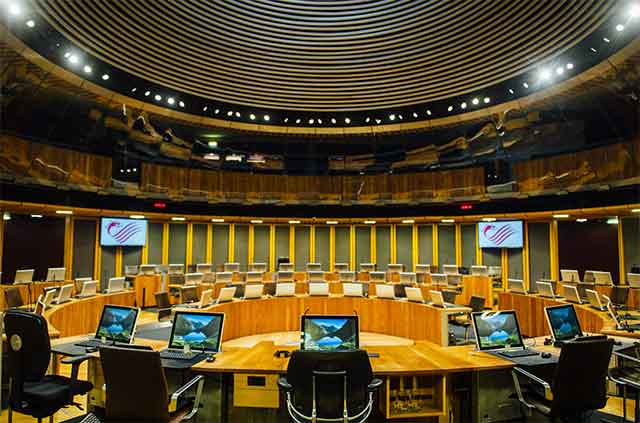The first minister accepted the need to win back farmers’ trust as he was scrutinised about Welsh Government support for rural Wales.
Vaughan Gething told a scrutiny committee the relationship with farmers has improved significantly in the months since widespread protests against subsidy reforms.
In May, the Welsh Government postponed the Sustainable Farming Scheme (SFS) until 2026 after a consultation received more than 12,000 responses.
Mr Gething raised the importance of taking a step back and listening but he stressed the need for compromise, adding: “You can’t please everyone.”
He said: “Farmers were the first group … I met when I first became the first minister to try to reset our relationship – to recognise that we need to have a further conversation.”
‘Rough end’
Llŷr Gruffydd, Plaid Cymru’s shadow rural affairs secretary, raised the farming sector’s calls for the SFS budget to increase by more than £500m due to inflation.
The first minister replied: “We’re not going to be able to put right the last 14 years in the next 14 weeks – and I think that’s a wholly unrealistic demand.”
Mr Gething told the committee: “There is a need for honesty about the scale of the hole that has been inherited by the new UK Government.”
He said farming got the rough end of Brexit, with the sector “sold out” in trade deals.
Mr Gething stressed the issue will not be resolved in the first Labour UK budget, warning the UK’s books are “in a worse state than the public were told”.
‘Stuck’
“There’s an even bigger hole than we thought,” said the former lawyer and trade union representative. “You can’t click your fingers and wish that away.”
Recalling Labour’s 1997 landslide, Wales’ first minister cautioned that it took two years to unlock significant investment “and I wouldn’t be surprised if we saw a similar picture”.
Mr Gruffydd raised concerns about water quality regulations, which include slurry storage requirements coming into force on August 1.
He warned some farmers are “stuck in the planning system” and may not be able to meet the regulations through no fault of their own.
Mr Gething assured the North Wales MS that discussions will be held with regulators and enforcement authorities about the practicalities.
‘Lost out’
Turning to transport, Labour’s John Griffiths raised comments from Stuart Cole, a professor of transport economics, who has warned rural Wales has “lost out” on spending.
Mr Gething said the Welsh Government took over responsibility for the core valleys lines which became a significant financial commitment, skewing spending figures.
Pressed about cuts to rail in some rural areas in Transport for Wales’ timetable review, Mr Gething pointed out that an average of six passengers used one Heart of Wales line route.
“You can run a flexi-bus service, you can’t run a flexi-rail service,” he said.
The first minister told the meeting forthcoming bus reforms, which would re-regulate the industry and introduce a franchising system, will be a real benefit to rural Wales.
‘Dominant’
On roads policy, Mr Gething described the former road-building programme as unaffordable, saying a new approach is needed in light of the climate and nature emergency.
David Rees, the Senedd’s deputy speaker or Diprwy Lywydd, who chairs the committee, raised suggestions that the south Wales metro has been too dominant.
Mr Gething said a better service in south Wales should give people confidence that it can be done in other parts of the country as well.
But he cautioned: “As ever, I can’t give you a definitive timeframe even though I know everyone would like me to – that’s about the balance of being honest and ambitious.”
Quizzed about the rural economy by Labour’s Jack Sargeant and the Conservatives’ Mark Isherwood, Mr Gething described digital connectivity as an essential enabler.
‘Deep, deep concern’
He pointed to Welsh Government investment in digital infrastructure despite responsibility being reserved to Westminster.
Turning to health, Russell George raised long-standing concerns about the recruitment and retention of dentists, doctors and other health professionals in rural Wales.
The Tory MS for Montgomeryshire criticised proposals to close Welshpool and Caernarfon air ambulance bases, which will be replaced by a new site in north Wales in 2025.
Pointing out that tens of thousands of people signed petitions and expressed “deep, deep concern”, Mr George asked why the Welsh Government did not step in.
Mr Gething said compelling evidence suggests the new model will lead to a better service for more people as he rejected calls to “override” clinician-led decisions.
“This isn’t about money,” he told committee members. “This is about what is the appropriate model to ensure people have the best possible service.”
‘Sense of place’
Labour backbencher Joyce Watson raised the importance of rural schools to communities such as those in her Mid and West Wales region.
Mr Gething said the Welsh Government strengthened the school organisation code in 2018 to include a presumption against closure and a higher test for councils.
He told the meeting at Llanelli’s Parc y Scarlets on July 12 that only one proposal to close a rural school – on Ynys Môn – is currently being taken forward.
“I grew up in a rural part of the world,” he said. “Where you have a primary school, in particular, it makes a really big difference … and a sense of place as well.”
Asked about access to school transport, Mr Gething pledged to take forward the recommendations of a review on learner travel.

